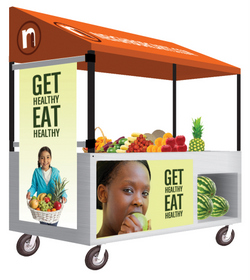
A Northwestern Medicine® study has found Chicago’s Neighbor Carts pilot program last year was profitable for the vendors selling fresh produce and a boon for customers buying fruit, vegetables, and nuts. It was so successful, in fact, this year the program will expand from eight to 30 carts, with new ones rolling out this month.
“Everyone was using the carts, from professionals getting off the train to tourists to people living in each community,” said Katherine Wright, a research coordinator in family medicine at Northwestern University Feinberg School of Medicine and co-investigator on the project.
The program, a collaboration between Neighbor Capital, which funds and runs the carts and trains the vendors, and StreetWise, a workforce development agency which supplies and prepares the candidates to operate the carts, is part food access and part workforce initiative. Half of the carts operate in underserved communities. In 2011, the Chicago department of housing and economic development provided a training grant to Neighbor Capital to support new vendors.
“The vendors are individuals who previously experienced homelessness, incarceration, addiction, or other barriers to employment,” Wright said. “This is really a stepping stone for them to be financially stable and successful. The vendors now think of themselves as micro-entrepreneurs and this is giving them a skill set to build on. A lot of them want to run more carts and take this to the next level.”
The program followed passage of an ordinance by the city council last June that provided new avenues for small business development in the city’s community. The ordinance was part of Mayor Rahm Emanuel’s ongoing efforts to increase access to healthy, fresh food throughout Chicago’s neighborhoods.
“Fresh produce carts provide one important avenue for increasing access to fresh, healthy foods, eliminating food deserts, and creating jobs right in our communities,” said Mayor Emanuel. “This is a win for local job creation and a win for the health of our families and children.”
An unexpected perk, Wright said, is that the carts may have been a crime deterrent based on feedback from aldermen. Next year, researchers plan to evaluate the carts’ possible crime deterrence.
The carts – attractive and with high quality produce – are designed to be an asset for any neighborhood.
Taking the carts program to the next level, Neighbor Capital has invested in a commissary in North Lawndale for centralized daily cart storage and distribution.
“The first pilot year we demonstrated that this can really work and it’s a good opportunity for vendors,” said John Piercy, president of Neighbor Capital. “This year we are investing in the program so it will be a template to endure for the long term. We expect to have 60 to 70 carts or more in five years. By investing in the infrastructure, we are taking street vending to new heights and setting the standard in Chicago.”
“We are in a good position to train, support, and empower folks with barriers to employment so they can earn a stable income,” Piercy added.
Neighbor Capital trains vendors – once they have been deemed ready by StreetWise – in the basics of street vending, customer service retention, produce management and care, retail sales, business principles, and financial management.
Jim LoBianco, the executive director of StreetWise, said two-thirds of the original candidate pool has remained in the program.
“All of them speak to how much they appreciate the quality of the work and the stable and supportive income it brings,” LoBianco said. “All have increased their financial stability as a result of this opportunity. They have blossomed in this environment.”
The Northwestern analysis was funded by the Joseph and Bessie Feinberg Foundation.






